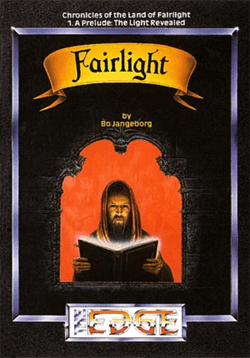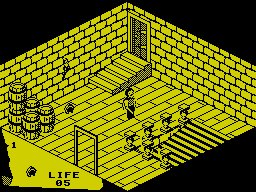Fairlight (video game)
| Fairlight | |
|---|---|
 | |
| Developer(s) | Edge Games |
| Publisher(s) | Edge Games |
| Designer(s) | Bo Jangeborg |
| Composer(s) |
Pennsoft (ZX Spectrum) Mike Alsop (C64) |
| Engine | Grax |
| Platform(s) | Amstrad CPC by Trevor Inns, Amstrad PCW by Trevor Inns, Commodore 64 by Trevor Inns, ZX Spectrum |
| Release date(s) |
1985 (ZX Spectrum) 1986 (Other platforms) |
| Genre(s) | Arcade adventure |
| Mode(s) | Single player |
Fairlight is an isometric projection arcade adventure video game developed by Bo Jangeborg and Jack Wilkes at EDGE Games and released in 1985. Developed in seven months, Jangeborg created the GRAX game engine using some prior code and components from his earlier project, graphics package The Artist. Wilkes contributed art assets towards the game, including enemy sprites and the title screen. The game was well received critically and commercially, selling over 50,000 copies, a sequel Fairlight II was released in 1986.
The game revolves around the protagonist Isvar, and his quest to find the Book of Light for the court sorcerer, in order for them to escape Castle Avars.
The ZX Spectrum version was one of the first (along with Technician Ted) to have an interactive loader - instead of the usual yellow/blue loading bars, a counter at the bottom of the screen ran backwards indicating how long until the game had loaded.
Gameplay

The player controls an adventurer named Isvar that can be moved in a castle which is not only three-dimensional isometric view, but realistic in terms of the way objects behave. Each object has its own physical properties and resultant characteristics in terms of how much else can be carried alongside it. Certain objects have special uses (e.g. keys open certain doors), and there is a puzzle element to the game to discover how some of these objects relate to the world in order to help the player solve the game.
In addition to carrying objects, they could also be stacked on top of each other to enable Isvar to climb up to rooms above him or to reach important objects perched high above on platforms. There are also a number of secret areas in the castle that are not visually obvious to the player and can only be discovered through exploration.
During Isvar's exploration of the castle he is accosted by its guards and monsters - trolls, monks, guards, tornadoes, man-eating plants, bubbles, etc. all of which weaken Isvar's energy. The castle also contains food and magical potions which will restore his health. In addition, certain game objects can affect the enemies, (by either killing them, distracting them, or freezing them, depending on the object and the type of enemy they are used upon)
Once defeated in combat a guard disappears leaving only his helmet behind. Helmets can be picked up and carried by Isvar, and placed somewhere else out of harms way (or into the path of a tornado, that destroys any object it touches). If Isvar leaves the room, the guard will regenerate from the helmet.
Reception
- Edge refused to pay Bo Jangeborg for Fairlight unless Bo signed up to make more games for Edge[1]
- Fairlight II was released without Bo's approval[1]
- The game won the awards for best arcade adventure, best graphics and best music of the year according to the readers of Crash magazine.[2][3]
- It placed number one on the UK list[3]
| Preceded by |
UK number-one Spectrum game January 1986 |
Succeeded by "Monty on the Run" |
References
- 1 2 TIGSource message by user Raiten recounting his interview of Bo Jangeborg
- ↑ http://www.crashonline.org.uk/27/awards.htm
- 1 2 [ttela: Bo banade vägen med datorspelet Fairlight http://www.ttela.se/kultur/kultur-och-n%C3%B6jesnytt/bo-banade-v%C3%A4gen-med-datorspelet-fairlight-1.1287304]